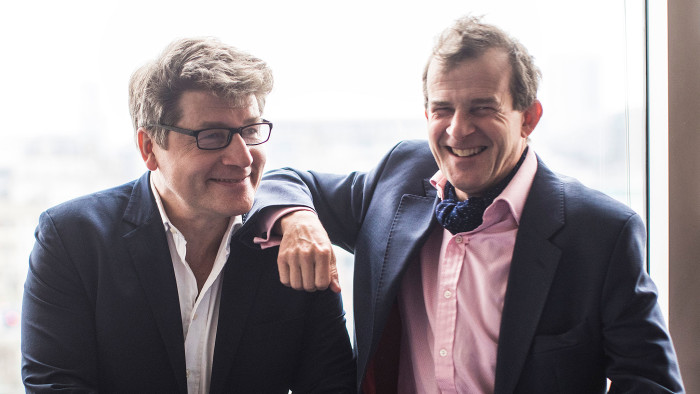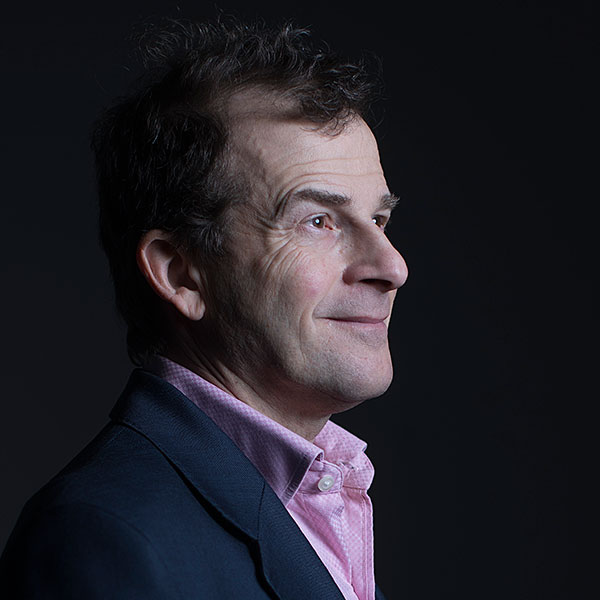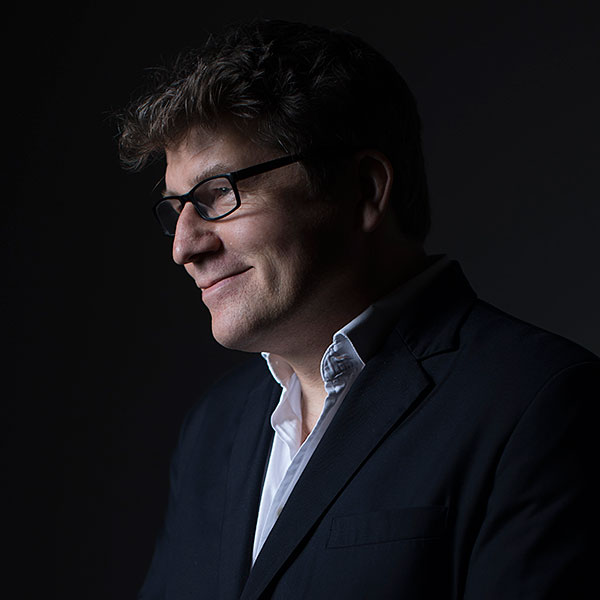Leo Johnson and Edward Bonham Carter on what makes a bold entrepreneur

Roula Khalaf, Editor of the FT, selects her favourite stories in this weekly newsletter.
Did you detect any common threads among this year’s winners and shortlisted candidates?
Leo Johnson : The core business principles that shaped the 20th century — fossil fuel-driven mass production — are undergoing a tectonic change. With the likes of Dong Energy and Air Liquide in the running for the Corporate Responsibility/Environment prize, we’re seeing an acceleration towards renewables — an unstoppable trend, in my view, over the next 20 years. We also had a set of winners whose dominant model involves not costly machines of mass production but the algorithm.
Edward Bonham Carter : We’re going from organic forms of intelligence to inorganic. Machine intelligence is being used to solve human problems. I was struck by the enormous variety of candidates, both in terms of the ingenuity of the products and services that they had developed, and the range of markets that they were addressing. I really liked the story, for example, of the tiny satellites manufactured by the Glasgow company Clyde Space in the Smaller Company category. In the running for the Developing Markets prize was Hector Beverages in Bangalore, with its traditional homemade soft drinks. It’s now commercialising them on a wider scale and putting two fingers up to giants like Coca-Cola.

LJ : If there is a thread it is that we are we seeing the potential of using technology for good. Take DeepMind in the Drivers of Change category. Here we have AI (artificial intelligence) being used to radically improve cancer detection.
EBC: That’s right. We’re in a world these days where complex problems such as disease management or even accurate weather forecasting could be solved by artificial intelligence.
Which companies did you feel were particularly bold?
EBC: Dollar Shave Club, winner of the Entrepreneurship award, struck me as especially bold as it took on the giants of the shaving market through its innovative marketing model. It was a case of the little David taking on the monsters. It’s just a shame it sold out to one of them [Unilever bought Dollar Shave in July]. It’s that argument again about the long versus the short term. We’re all in such a rush, with people taking the greenback rather than aiming for, say, the old Victorian legacy of building something big.
LJ: For me, the bold companies are those that execute [a plan] at speed and scale to attack society’s unsolved problems. Dong transformed from being the leading oil and gas company in Denmark to one of the leading renewables companies in the world. Engie in France — and one of the companies on the Drivers of Change shortlist — is another one. It shifted from fossil fuel power to sustainable energy production.
What were you looking for in the candidates?
LJ: Those that are using the means at our disposal to deliver something valuable for the many: clean water, sanitation, education. Look at Paytm on the Developing Markets shortlist. In India its mobile commerce platform tackles the massive problem of providing access to finance. In the Technology section, the Israeli company CropX is another. It uses big data to create targeted micro irrigation; farmers save water and energy by being able to water crops only in areas of their fields that need it.

EBC: Yes, it’s a bit of a curate’s egg this year, but there are hints of that here. Impossible Foods from California and its meat-free products in the Corporate Responsibility/Environment category is an interesting one. It aims to recreate the taste and nutrition of meat without the impact on the environment of animal farming. If we can replace meat, that’s a worthy cause.
One test of a successful company is whether others can replicate what it does. Where is the “economic moat”, as Warren Buffett once put it, that will defend its revenues over the long term? Any of the winners catch your eye?
EBC : Judging enduring barriers to entry is virtually impossible as it involves a series of imaginative leaps into the future. Many, if not all, of the candidates and winners were operating at the frontiers of human ingenuity, so if developing a sustainable advantage will be a particular challenge, you can argue that Empresas Polar, the food and drinks maker based in Caracas, has developed a distinctive barrier to entry. It is competing successfully in the political, economic and social conditions in Venezuela. That in itself is a competitive advantage.
LJ : It brought back memories of Santa Teresa, the Venezuelan distiller that was unlucky not to win the Developing Markets prize a couple of years ago. Part of its economic moat is distinctiveness. It’s a unique local rum, some of which, I am happy to say, it brought to the awards ceremony in London.
EBC : Companies that operate under conditions like these, you have to credit with ballsiness as well as boldness.
Was there any candidate slightly off the wall that took your fancy?
EBC : Many of the candidates and winners are focused on how homo sapiens can live sustainably on our “small blue marble”, though most of the products here are intangibles. I had a soft spot for The Furniture Recycling Group in Blackburn [UK]. It has developed an automated process for taking apart mattresses so that all parts of them can be recycled. You can’t get much more tangible than that.
LJ : You’re right. There is yet to be a day on my home street when there isn’t an old stained mattress dumped with little immediate hope of it being carted away. This shows what we need — not technology substituting for the human, but technology aiding our ingenuity to solve real world problems.
Getting back to the subject of an overall theme for the year, we can see that robots and artificial intelligence, such as automated driving systems, are among activities that are well represented. What problems, or opportunities, is present day boldness in business opening up for future prize winners to address?
EBC : I suspect we will see an increasing number of enterprises focusing on robotic technology and AI, as well as the matter of increasing human longevity. For the first time in human history some forms of human intelligence will be overtaken by “machines”. How we live in this world will in itself be an exciting challenge.
LJ : We can look forward to some literally incredible things. Look at Human Longevity, the California company in the running for this year’s Drivers of Change award. With its human genome sequencing work, it’s looking to double life expectancy in the next 20 years. Some even say that anyone now under 50 has a 50/50 chance of living for ever. What does this mean? A new style of Übermensch? I also feel uneasy about the potential impact on society of structural job loss, an automation bomb that could be detonated by AI. Without technological governance, we might be sleepwalking our way into it.
EBC : This is the dystopian view. Many millions of jobs are due to go in the next two decades or so. What are we going to do? There could be the most extraordinary concentration of wealth, with all the rest of us living on the universal basic income. As far as robots and AI are concerned, the genie is already out of the bottle, though of course — and here’s one for those bold award candidates of the future — there’s a counter argument that if machines get out of hand we can pull the plug. I’m not sure we are clever enough.
Comments